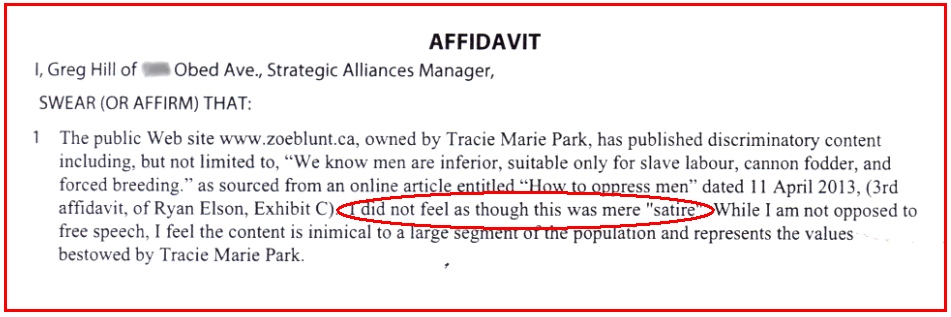
Affidavit by Greg Hill, young entrepreneur and We Are Change wingnut, in Park vs. Elson, BC Supreme Court (2012). Source: Court documents. Tracie Park is my legal name.
Maybe you know a nutter freedom fighter battling the tyranny of fluoride, Agenda 21, and being called a “racist” “sexist” “idiot” all the time. Maybe that is you! Either way, good news: this handy legal guide is here to help.*
Did someone call you a name? Take a photo of you in public? Or even worse, publish it? Use this guide to get justice and/or revenge in civil court.
BEFORE THE CASE
1) Give your opponents fair warning about your complaint. Threaten them with lawsuits and arrest at every opportunity. That will establish your credibility as a wingnut man to be feared. Send threatening messages and get all your friends to join in. Note: This doesn’t always work – sometimes people call your bluff.
2) Combine threats and demands. Demand your adversary “debate” you, for example, and threaten to “expose” them with thousands of posters naming them as criminals if they don’t. Judges call this “extortion” and it will look good on you in court, if it comes to that.
IF YOU’RE INVOLVED IN A CIVIL CASE
1) Remember the law is always evolving, so it can be whatever you make it. You can redefine words and legal concepts to reflect your libertarian values.
2) Lawyers will try to take all your money and your rights. Don’t bother consulting them. Your Freemen friends will give you plenty of tips.
3) The rules of the court are designed to confuse you and take away your freedom. Don’t bother reading them. You will automatically get points for doing it your own way, bringing a fresh perspective and figuring it out as you go along.
4) Remember the judge has great power in the courtroom. So you have to be very firm to get what you want. For example, you want someone arrested, but the police won’t take a report? Get the judge to arrest them instead. (Remind the judge that the police are biased in favour of women, people of colour, and Bolsheviks. Show him the proof on Infowars.com.)
PLEADINGS
Examples of pleadings include a notice of claim (to start a court case) or a counterclaim (to retaliate). Pleadings are supposed to be straightforward, but you can make them very very complicated if you want. That will impress the judge.
1) Don’t limit yourself to facts. Gossip, speculation, and innuendo will broaden the scope of your complaint. Put it all in your pleading as evidence.
2) Reporting about events you didn’t witness is called “hearsay” and it’s the best kind of evidence. Put it in your pleading.
3) Not sure what to accuse your enemy of? Use whatever sounds best to you. “Blasphemous Libel” is a good one. “Malicious Prosecution” is even better. Or make something up. You can always define your legal terms for the judge later.
FOR LIBEL CLAIMS
1) Get your hands dirty. Well before the case starts, you should be pummeling your adversaries in the court of public opinion. So if they call you out for being “racist” and you reply that they are the “real racists,” and then you call them “Bolsheviks” and “terrorists” and “mass murderers,” and then you make blogs and videos about it, and then you sue them for calling you “racist,” your position is unbeatable.
2) Republish the offending material. It’s best if you publish your enemy’s insults over and over, word for word, in their entirety. Make sure the whole world knows exactly how your feelings got hurt. When you get to court, explain to the judge that it’s only libel when someone else says it, and consent doesn’t matter.
3) Don’t worry about free speech, the Charter of Rights or the Constitution. Granted, this can be tricky for those who say they value free speech and personal liberty and so on. But remember, the Charter and the Constitution were designed to protect men of liberty and punish everyone else. So you can – and should – demand that the judge shut your enemies down and forbid them from speaking or writing about you again, ever, or else.
Go forth and conquer!
—
* Note: we are not here to help – we’re actually here to laugh at you.
Disclaimer: This guide is provided without warranty and does not constitute actual legal advice. Information contained here may not apply outside the Province of British Oolumbia, or inside of it, either.

